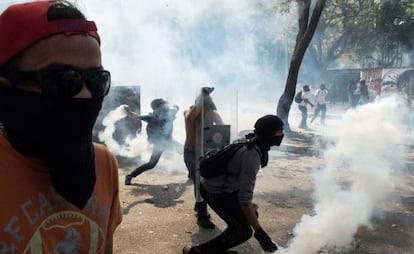Venezuelan troops try to crush unrest in nation’s third-largest city
Top US military official warns of "catastrophic" demise of Maduro government

Venezuelan President Nicolás Maduro on Thursday sent military troops into Valencia, which has become the epicenter of anti-government protests and where three people have been killed over the past two days.
In Washington, a top US military official warned that Venezuela would go down “catastrophically” if the political differences between the Maduro government and the opposition were not resolved soon.
Residents in several middle-class neighborhoods in Valencia, the nation’s third-largest city, woke up on Thursday to see military tanks and troops on their streets.
Maduro, who had warned he was going to take drastic measures to quell the violence that has rocked the South American country over the past month, also ordered security forces to raid homes and businesses. Human rights lawyers quickly pointed out that the president was violating the Constitution by ordering the searches without a court order.
Wednesday marked exactly a month since the outbreak of violent nationwide anti-government demonstrations, which have snowballed into non-stop unrest after they started out as a student protest at a university campus in the western state of Táchira.
This week, Valencia has become the focal point of the ongoing violence with demonstrators clashing with National Guard troops who fired tear gas and rubber bullets from behind makeshift barricades. A student, a sports trainer and a National Guard officer were reportedly killed in the demonstrations, bringing the death toll to 25 since the unrest kicked off.
Family members of Guillermo Sánchez said armed pro-government supporters killed the 42-year-old trainer in cold blood. “They deliberately shot him in front of everyone, and didn’t try to disguise themselves with masks or anything else,” his cousin Luis Acosta told a local newspaper.
Residents in several Valencia neighborhoods woke up on Thursday to see military tanks and troops on their streets
“I can tell you that about 50 or 60 people on motorcycles were shooting their weapons at buildings and throwing rocks at us,” Sánchez’s wife Gina Rodríguez told CNN. “My husband and I ran and he went inside one building. They got him and took him away.”
But Carabobo Governor Francisco Ameliach, a former army officer and close aide to the late President Hugo Chávez, maintained that all three victims were protestors who had been killed by their own sharpshooters perched on buildings.
Social conditions throughout Venezuela have deteriorated rapidly over the past month.
In Washington, US Secretary of State John Kerry called on the Maduro government to end its “terror campaign” against Venezuelans.
“We are trying to find a way to get the Maduro government to engage with its citizens, to treat them respectfully, to end this terror campaign against his own people and to begin to, hopefully, respect human rights in an appropriate way,” Kerry told a congressional committee.
At another hearing in the Senate, John Kelley, commander of the US Southern Command questioned whether Maduro had the full support of the Venezuelan military.
“It is a situation that is obviously just coming apart in front us, and unless there is some type of a miracle that either the opposition or the Maduro government pulls out, they are going down catastrophically in terms of economy, in terms of democracy,” he said.
Earlier this month, two influential senators called on President Obama in a resolution “to immediately impose targeted sanctions, including visa bans and asset freezes, against individuals planning, facilitating, or perpetrating gross human rights violations against peaceful demonstrators, journalists, and other members of civil society in Venezuela.”
Tu suscripción se está usando en otro dispositivo
¿Quieres añadir otro usuario a tu suscripción?
Si continúas leyendo en este dispositivo, no se podrá leer en el otro.
FlechaTu suscripción se está usando en otro dispositivo y solo puedes acceder a EL PAÍS desde un dispositivo a la vez.
Si quieres compartir tu cuenta, cambia tu suscripción a la modalidad Premium, así podrás añadir otro usuario. Cada uno accederá con su propia cuenta de email, lo que os permitirá personalizar vuestra experiencia en EL PAÍS.
¿Tienes una suscripción de empresa? Accede aquí para contratar más cuentas.
En el caso de no saber quién está usando tu cuenta, te recomendamos cambiar tu contraseña aquí.
Si decides continuar compartiendo tu cuenta, este mensaje se mostrará en tu dispositivo y en el de la otra persona que está usando tu cuenta de forma indefinida, afectando a tu experiencia de lectura. Puedes consultar aquí los términos y condiciones de la suscripción digital.








































